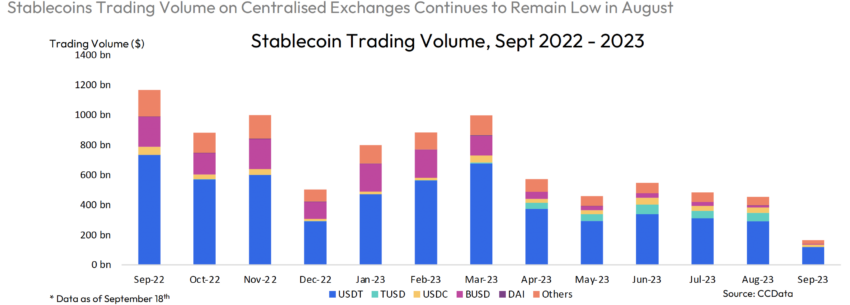Japan’s largest financial institution, Mitsubishi UFJ Trust Bank, will collaborate with Binance to issue new stablecoins in line with new regulations. Japanese bank ORIX Bank will launch yen and US dollar-backed stablecoins in 2024.
Binance qualified as an issuance partner because it already holds a license to serve traders in Japan. Other companies can issue stablecoins when the Financial Services Agency of Japan approves their license applications.
Banks Expected to Drive Large Stablecoin Volumes
According to information released in June, platforms like Mitsubishi’s will allow stablecoins backed by Japanese yen and US dollars to be issued on public networks like Ethereum and Polygon in line with Japanese regulations. Mitsubishi developed its Progmat platform in line with the Japanese government’s “Revised Funds Settlement Act.”
The legislation, passed in 2022, recognizes stablecoins as a new electronic payment method. Consequently, banks, trust companies, and transfer operators can issue them. However, asset-circulating companies require a separate license to do so.
Companies can now use new coins to streamline foreign trade transactions, bypassing Japan’s internal banking network. Following this development, the announcement made in June provided further clarification.
It confirmed that businesses have the capability to use coins they issue through Progmat not only for the purpose of purchasing non-fungible tokens (NFTs), but also for acquiring digital securities.
Find out more here about the potential of digital securities to change traditional finance.
Businesses are expected to drive the most stablecoin transactions, as B2B volume accounts for around 1,000 trillion yen ($6.7 trillion).
Binance Could Receive Much-Needed Inflows
The Mitsubishi-Binance deal comes at a time of muted stablecoin activity on exchanges, according to a report by CCData. Regarding Binance, volumes of its BUSD stablecoin fell after New York regulators ordered issuer Paxos to stop minting the coin.

Find out more here about how stablecoins work.
The boost from B2B business activity in Japan could offer the exchange some much-needed liquidity as it loses market share in some Western jurisdictions, including Germany, the Netherlands, and Cyprus. Its US business has seen a 90% decline in trading volumes after actions by US regulators.
In the meantime, trading volume for PayPal’s new PYUSD stablecoin rose by 400% between August and September. Incidentally, Paxos is the issuer of the new stablecoin.
Something to say about the stablecoin Binance will issue in with Mitsubishi UFJ Trust Bank, stablecoin regulations in Japan, or anything else? Please write to us or join the discussion on our Telegram channel. You can also catch us on TikTok, Facebook, or X (Twitter).
 beincrypto.com
beincrypto.com
